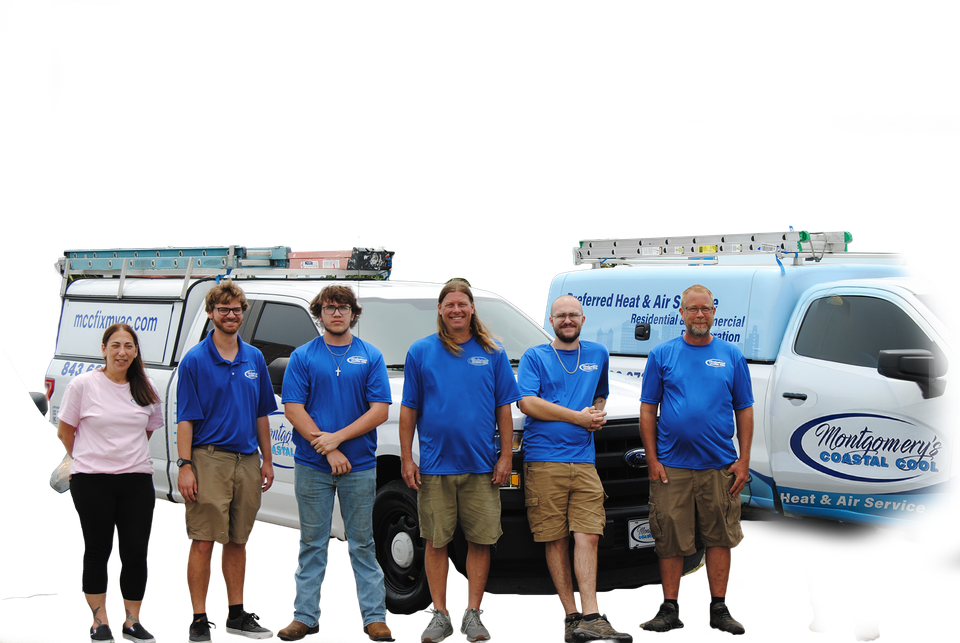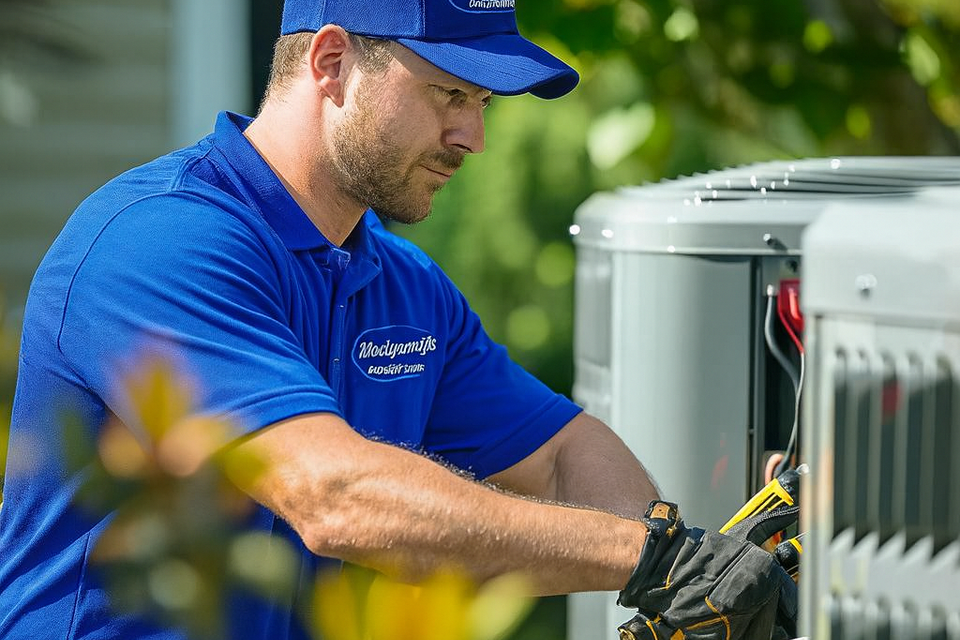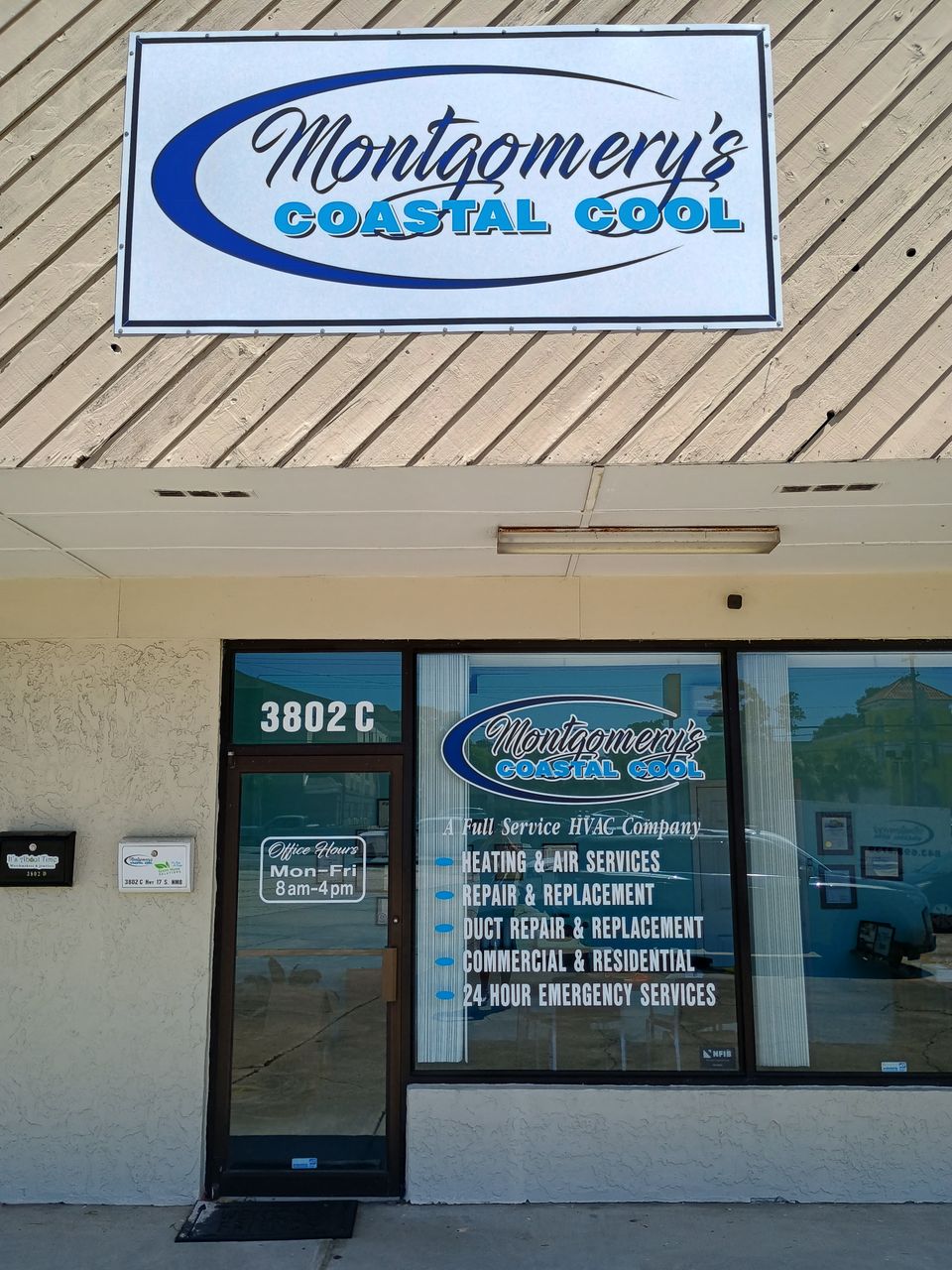How Can Regular Maintenance Extend the Life of Your HVAC System?
Think of regular HVAC maintenance like getting oil changes for your car. Routine tune-ups, including filter replacement, coil cleaning, and refrigerant level checks, prevent wear and tear, optimize performance, and even protect your warranty coverage. Consistent care can extend your equipment's life by up to 30%, helping you avoid costly repairs and keeping your system running at peak efficiency for years.
How Does Montgomery's Coastal Cool Provide Expert HVAC Repair Services in Myrtle Beach?
At Montgomery's Coastal Cool, we're not just another emergency HVAC repair service company; we're your neighbors who truly understand what it takes to keep your home comfortable in Myrtle Beach's demanding climate. Our certified technicians bring local expertise, transparent pricing, and 24/7 emergency response to ensure your system operates reliably, no matter what. We combine our deep local knowledge with industry-leading practices to resolve issues quickly and prevent those frustrating repeat calls.
What Local Expertise Does Montgomery's Coastal Cool Offer for Coastal Climate HVAC Challenges?
Our employees live and work right here in Myrtle Beach, so we truly understand the unique challenges of salt-air corrosion, high humidity, and fluctuating load demands that our coastal environment throws at your HVAC system. We apply specialized anti-corrosion coatings, implement effective humidity control strategies, and perform routine coil inspections to combat accelerated wear and tear, keeping your system robust.
How Do Certified Technicians Ensure Quality HVAC Repairs?
When you choose Montgomery's Coastal Cool, you're choosing peace of mind. All our repair personnel hold NATE certification, which means they've met the highest industry standards. They also undergo continuous manufacturer training, ensuring they install only genuine OEM parts and follow strict quality checklists. This rigorous approach minimizes callbacks and helps uphold your system's warranty.
What Emergency HVAC Repair Services Are Available 24/7 in Myrtle Beach?
AC breakdown in the middle of a hot Myrtle Beach night? Don't sweat it! Montgomery's Coastal Cool provides round-the-clock emergency support, guaranteeing our rapid response teams arrive within hours of your service request. We keep our trucks stocked with common replacement parts so we can restore your comfort without long, uncomfortable delays. Myrtle Beach AC repair is just a call away.
How Transparent Is the Pricing and What Customer Satisfaction Guarantees Are Offered?
We believe in honest, upfront service. That's why quotes from Montgomery's Coastal Cool are always itemized by labor, parts, and diagnostic fees *before* any work begins – no hidden charges, ever. Plus, every repair we perform comes with a satisfaction guarantee, and we often follow up with inspections to ensure your issues are truly resolved and you're completely happy.
What Are the Benefits of Regular HVAC Maintenance in Myrtle Beach?
Regular maintenance isn't just about fixing problems; it's about preventing them! It significantly reduces breakdowns, boosts your energy efficiency, and even enhances your indoor air quality by tackling dust and mold spores. For example, simply replacing filters and cleaning coils can lower your electricity consumption by up to 15% while preventing allergen buildup, helping you breathe easier.
HVAC System Efficiency and Energy Savings: The Real Impact
Did you know that consistent HVAC maintenance, like changing filters and cleaning coils, can dramatically improve your system's energy efficiency? Research from the U.S. Department of Energy shows these practices can cut electricity consumption by up to 15% and significantly extend the life of your equipment. That's real savings in your pocket!
U.S. Department of Energy, Energy Efficiency and Renewable Energy (2024)
This research backs up our claims about how much you can save and how much longer your system can last with regular, professional maintenance.
What Is Included in a Comprehensive HVAC Tune-Up Checklist?
When we perform a full-service tune-up, we cover all the bases to ensure your system is running its best:
- Thorough air filter inspection and replacement (if needed)
- Detailed cleaning of evaporator and condenser coils
- Precise refrigerant level verification and leak testing
- Lubrication of motors and blowers for smooth operation
- Careful inspection of all electrical connections and controls
Completing every item on this checklist is how we maximize your system's reliability and efficiency, season after season.
How Does Maintenance Improve Energy Efficiency and Indoor Air Quality?
It's simple: clean coils and filters allow for proper airflow, which means your compressor doesn't have to work as hard or run as long. This directly translates to lower energy use and lower bills! Beyond that, removing dust, pollen, and microbes from your ductwork and components delivers healthier, cleaner air throughout your home, significantly reducing allergy triggers indoors.
What HVAC Service Plans Are Available for Myrtle Beach Homeowners?
At Montgomery's Coastal Cool, we make consistent care easy and affordable. We offer tiered maintenance plans that include convenient bi-annual inspections, priority scheduling for any service needs, no-diagnostic-fee repairs, and even discounted parts. These plans ensure your system receives consistent, expert care, ultimately lowering your overall service costs and giving you peace of mind.
How Often Should You Schedule HVAC Maintenance in Coastal Areas?
Given our unique coastal climate, we highly recommend scheduling HVAC tune-ups twice a year: once in the spring to prepare for the intense summer cooling demands, and again in the fall to get ready for winter heating. This twice-annual servicing is crucial for preventing salt-air buildup and keeping your refrigerant levels optimal, ensuring peak performance year-round.
How Can You Troubleshoot Common AC Problems Before Calling for Repair?
Sometimes, a little DIY troubleshooting can save you time and money by identifying minor AC issues or helping you determine when it's truly time to call in the pros. For instance, a simple filter change might be all it takes to restore airflow, while more complex electrical faults definitely require our trained technicians.
How to Check and Replace Dirty Air Filters for Better Airflow
Checking your air filter is one of the easiest and most impactful things you can do! Just remove the access panel on your indoor unit and hold the filter up to the light. If you can't see light through it, it's time for a replacement. Filters come in standard sizes, and we always recommend choosing high-efficiency pleated filters to capture even the finest particles and keep your air cleaner.
Routine filter changes are essential for consistent airflow and preventing unnecessary strain on your blower motor.
What Steps Can You Take to Diagnose Strange Noises from Your AC Unit?
Hearing grinding, squealing, or rattling sounds from your AC can be unsettling. Start by listening carefully at startup or during operation. Then, check for any loose panels or fan blades, tighten screws, and clear any debris around your outdoor unit. If the noise persists, especially if it sounds like a motor or belt issue, it's best to contact a technician.
Identifying unusual noise patterns early can often prevent a minor issue from escalating into a major mechanical failure and a much more expensive repair.
How to Detect and Clear Clogged Condensate Drain Lines
If you suspect a clogged condensate line, first locate the PVC drain line near your indoor unit and check for any leaks or pooling water. A common DIY fix is to use a wet/dry vacuum at the drain outlet to suck out the clog. After that, flushing the line with a vinegar solution can help inhibit future algae growth.
Keeping those condensate lines clear is vital for preventing water damage and avoiding system shutdowns triggered by the float switch.
When Is It Safe to Run Your AC Despite Minor Issues?
It's generally okay to run your AC if you're experiencing minor issues like slightly reduced cooling performance or minor airflow restrictions, *as long as* there are no refrigerant leaks, electrical faults, or water leaks present. However, it's always wise to monitor your system's performance closely. Catching worsening conditions early can save you from a much bigger headache down the line.
Staying aware of minor symptoms helps you avoid them escalating into major, costly failures.
What Are the Average Costs for HVAC Repair Services in Myrtle Beach?
HVAC repair in Myrtle Beach costs can vary quite a bit depending on the complexity of the issue, the availability of parts, and whether you need emergency service. Minor repairs, like replacing a capacitor, might cost under $200, while major component swaps or refrigerant recharges can range up to $800.
How Much Does Refrigerant Leak Repair Typically Cost?
If your system needs a refrigerant recharge after a leak repair, you can typically expect to pay between $150 and $400, depending on the type of refrigerant and your system's size. Keep in mind that leak detection often involves diagnostic fees, though these are sometimes waived if you're on one of our maintenance plans.
What Is the Price Range for Compressor Replacement?
Replacing a compressor is a more significant repair, typically ranging from $600 to $1,000 for both parts and labor. For high-efficiency or specialty compressors, those replacement costs can sometimes push closer to $1,200.
How Do Emergency HVAC Repairs Affect Pricing?
We understand that HVAC emergencies don't always happen during business hours. After-hours or weekend emergency calls typically incur additional service fees, usually in the range of $100–$200. These premiums help cover technician overtime and ensure we can provide rapid dispatch and prompt system restoration, 24/7.
Are There Financing or Estimate Options Available?
At Montgomery's Coastal Cool, we want to make sure you can afford the comfort you deserve. That's why we offer flexible financing plans with competitive low-interest rates and even no-interest promotions for up to 12 months. Plus, we provide free, no-obligation estimates and free second opinions from other local Myrtle Beach Heating and Air companies to help you budget for major repairs or system replacements with complete confidence.
The quickest way to reach us for an estimate is to give us a call at 843.698.2739
How Does Indoor Air Quality Impact Your HVAC System in Myrtle Beach?
Indoor air quality (IAQ) is a big deal, especially here in Myrtle Beach! It directly affects how well your HVAC system performs by influencing how quickly filters get dirty, coils get fouled, and allergens circulate. High humidity and airborne salt particles can corrode coils, reduce heat-exchange efficiency, and even worsen respiratory issues for your family.
What Air Purifier and Humidifier Solutions Are Recommended Locally?
To combat our coastal air challenges, we often recommend whole-home HEPA air purifiers and energy-recovery ventilators. These systems significantly improve filtration and fresh-air exchange. For managing our notorious humidity, bypass humidifiers are excellent at controlling moisture levels. Installing these devices not only reduces strain on your HVAC components but also dramatically enhances your family's comfort and health.
How Does Coastal Humidity Affect HVAC Performance and Air Quality?
Our high outdoor humidity forces your evaporator coils to work overtime, which can lead to issues like coil icing or condensate overflows. Properly sized dehumidification equipment and regular coil cleaning are essential for mitigating these effects, preserving your cooling capacity, and preventing mold growth that thrives in damp conditions.
When Should You Consider Duct Cleaning Services in Myrtle Beach?
Duct cleaning is a smart move if you notice visible mold inside your ducts, after a pest infestation, or if long-term dust and debris buildup is clearly reducing your airflow by more than 20%. Clean ducts mean healthier air circulating through your home and improved system efficiency by restoring unobstructed pathways for air.
Can Your AC Help Reduce Mold and Allergens Indoors?
Absolutely! Running your AC with clean filters and maintaining proper humidity levels is a powerful way to capture airborne allergens and mold spores. When combined with UV-C coil treatments, your system can actively reduce microbial growth on coils and in ductwork, significantly improving your overall indoor air quality and helping everyone breathe easier.
Maintaining clean, dry coils and ducts truly transforms your air conditioning system into a proactive health device for your home. At Montgomery's Coastal Cool, we're proud to bring the best Duct cleaning Myrtle Beach residents deserve. We're here to ensure you get reliable repairs, proactive preventative maintenance, and top-notch indoor air quality solutions, all tailored specifically for your home or business. You can trust our certified technicians, transparent pricing, and 24/7 HVAC emergency repair support to keep your system running efficiently in every season. Don't wait for discomfort to strike – schedule your service today to protect your investment, lower those energy bills, and enjoy uninterrupted comfort in Myrtle Beach’s unique coastal environment.




